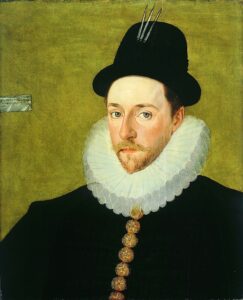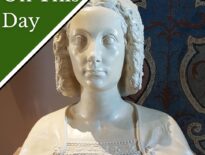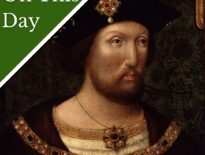 On this day in Tudor history, 12th October 1555, soldier and diplomat Peregrine Bertie, 13th Baron Willoughby of Willoughby, Beck, and Eresby, was born at Wesel in Cleves.
On this day in Tudor history, 12th October 1555, soldier and diplomat Peregrine Bertie, 13th Baron Willoughby of Willoughby, Beck, and Eresby, was born at Wesel in Cleves.
Bertie was the son of Richard Bertie and his wife, Katherine (née Willoughby), Duchess of Suffolk and widow of Charles Brandon, Duke of Suffolk. Bertie was born while his Protestant parents were in exile during Mary I's reign.
Here are a few more facts about Peregrine Bertie:
- Bertie's mother, Katherine, was the daughter of William Willoughby, 11th Baron Willoughby de Eresby, and Maria de Salinas, who had accompanied Catherine of Aragon from Spain to England in 1501. Katherine was not only Duchess of Suffolk, as the widow of Charles Brandon, she was also 12th Baron Willoughby de Eresby in her own right.
- Berties first name, Peregrine, is said to have derived from his parents' "peregrinations", their journeys in exile during Mary I's reign.
- Following the family's return to England when Elizabeth I came to the throne, they loved at Grimsthorpe Castle in Lincolnshire.
- Bertie had an older sister, Susan, who married Reginald Grey of Wrest, Earl of Kent, and then, after his death, she married Sir John Wingfield, nephew of Bess of Hardwick.
- Bertie was educated in the household of William Cecil, Elizabeth I's chief advisor, where he met and fell in love with Mary de Vere, daughter of the late John de Vere, 16th Earl of Oxford. They married and had five sons and one daughter. The couple separated in 1600.
- In 1580, Bertie became 13th Baron Willoughby of Willoughby, Beck, and Eresby following the death of his mother. His father died in 1582.
- Bertie was a diplomat, carrying out his first mission, as a special ambassador, in 1582. He was sent to Denmark to invest Frederick II, King of Denmark and Norway, with the Order of the Garter. He returned to Denmark in 1585 to try and get Frederick to offer Danish help to Henri of Navarre, leader of the Huguenots, and to help the Dutch in their war against Habsburg rule in the Netherlands.
- Bertie was a soldier and a good leader. In 1586, he was governor of Bergen op Zoom and fought at the Battle of Zutphen in September 1586, leading the English cavalry charge. From December 1587, he was Elizabeth I's commander-in-chief in the Netherlands, and in 1588, he was made lieutenant-general. In the summer of 1588, he commanded ships that prevented the Spanish Armada meeting up with the Duke of Parma's forces, and in November 1588, he held Bergen successfully against a Spanish siege. In 1589, he acted a general of troops sent to aid Henry IV of France (formerly Henri of Navarre). Bertie and his men helped the French king capture five fortresses and the port of Honfleur was also taken. He declined to return to France in 1591 due to ill health.
- In his later years, Bertie suffered bouts of malaria. His biographer, D.J.B. Trim believes that he picked up malaria in the swampy Netherlands. In the 1590s, he travelled abroad, taking the waters in various spa towns and sending reports back to the Earl of Essex on what was going on abroad.
- In 1598, Bertie was appointed Governor of Berwick upon Tweed and Warden of the East March.
- Bertie died of a fever at Berwick on 25th June 1601. He named his nineteen-year-old heir, Robert, as the executor of his will. He was buried in the Willoughby Chapel at Spilsby Church in Lincolnshire.
- Three ballads praise him.
Also on this day in Tudor history...
Image: A portrait of Peregrine Bertie by Robert Peake the Elder
Notes and Sources
- Trim, D. (2008, January 03). Bertie, Peregrine, thirteenth Baron Willoughby of Willoughby, Beck, and Eresby (1555–1601), nobleman and soldier. Oxford Dictionary of National Biography, https://www.oxforddnb.com/view/10.1093/ref:odnb/9780198614128.001.0001/odnb-9780198614128-e-2275.



Thanks for the info, Claire – I still follow your posts. Finished Katherine and the Howards at last and found a publisher, but took years over it because I was able to go off at tangents just for my own interest, including looking further into the Brandons’ story than I needed. Also, I had not realised before that Henry VIII was on the lookout for another wife only weeks after Jane Seymour’s death! Best wishes, Marilyn.